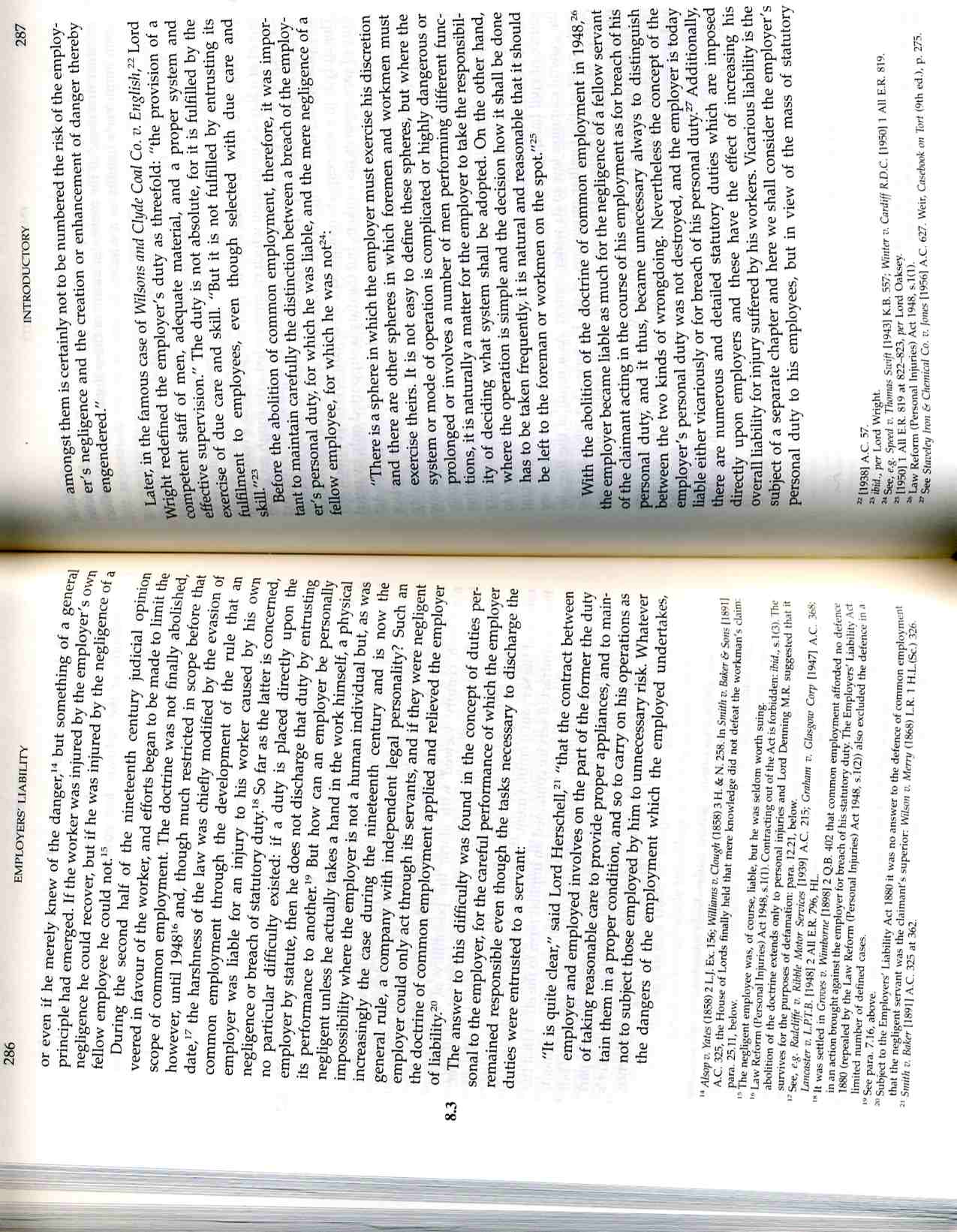img036 5

286
EMPLOYERS' LIABIUTY
1NTRODUCTORY
287
ass&ss ansif he - ■*- >> *• -ter:
Dunng the second half of the nineteenth century judicial on veered in favour of the worker, and efforts began to be madę to IS** scope of common employment. The doctrine was not finaUv ib ? ^’
datę-rjh" l™" a,"d- ,hOU8h ">«•> -trlcted in »op“ ^ ^ e, the harshness of the law was chief]v modified bv The evasin ^ common employment through the develoDment of th * n of
employer was liable for an fnjury to h^Zker **
neghgence or breach of statutory duty.1* So far as the latter ■ ' ^ °'Vn no particular difficulty existed if a , ! ,tter 15 con««ied,
employer by statute. .LTd^o, ^ “P ^
its performance to another.» Bot how can an employer' be pełn ił8 neghgent unless he actually takes a hand in the work hlmself TohZZ lmpossibihty where the employer is not a human indiyidual bi/as i^
generaTmle a c ^ during. the nineteenth century and is now the' generał rule, a company with independent legał personality? Si.rh
thTdSri fd °nly 3Ct thrOU8h 'tS servants' if they wereneglLn" óf liabibty" " °f COmmon ”>*»-« aPpIled and relieyed the
. *£Ss
ZZ quite C!far'" fid Lord Herschell,- "that the contract between employer and employed mvolves on the part of the former the duły
tiin e^J Sa°n 6 ^ 5 P""** pr°per aP**««* ««d
in them in a proper condition, and so to carry on his ooerations as
!he dange^T emP',OVed by him *° Whateyer
the dangers of the employment which the employed undertate.
A-C.' 325. o^Lo^^uf held Im & j-J™'ln S"""'r Baker&I189,1
para. 25.11. Mo» ' ,ha' merc knowled8* d,d not defeat the aorkmans claim
: st;? r *MTJwrth «**
abolition o( the doctrine exłends onlv tó personal inhfri“ forbidden: *-><3t The
, sun-iees for the purposes of defamahon: £ra. 1221. Mo w °ennin* MK *“«**»«» »h" *
hee, e.g. Railcliffe v. Ribhlr Motor Sermccs (19391 AC ">15 Graham n r
Uncaster v. LP.T.B. |194S( 2 Ali E R. 796 HL ~ ' Crnlulm v- Glasgow G>rp |1947) A.C 368.
" -n auh^ com">°n employment atforded no de,en.
r^8<l^eP0J'ea b^ (he^»vłReform^^^|^r| ^jurieT/Art^4St,sT(2))t^l ^7lal!?er5 ,-**'bd'b 'Vl
limited numher of detined cases. U '' Ac* ,9ł8< s 1 <2)) algo evcluded the defence in ■<
'“See para. 7 16, above.
21 Smith P. B^r 118911 A.C. 325 a, %2 S SUPCnor: MIm"' <’ Meny ,1868) L R. 1 H.L.tSc ) 326
ct bhp™ is certainly not to be numbered the risk of the employ-ejc^negllgence and the creation or enhancemen. o, danger thereby
engendered."
• ihP famous case of Wilsons and Cli,dc Coal Co. v. Engltsh Lord Uter' a iTthe emplover's duty as threefold: "the pnwision ot a wright redefmed h^emplo^^ and a pr„pe, system and
compete11 „ Tj duty is not absolute, for it is fulfilled by the
^'e rfdóe careatU skiU "But it is no, fulfilled by entmsting its ^eni to employees. even though selected with due cant and
S^'(Z the abolition of common employment, therefore, it was importu maintain carefully the distinction between a breach of the emp oy-S personal duty, for which he was liable, and the mere negligence o fellow employee, for which he was not"4:
"There is a sphere in which the employer must exercise his discretion Jd there are other spheres in which foremen and workmen must SemiseTheL”, is no, easy to define these spheres but where the system or modę of operation is complicated or highly dangetcios pmfonged or involves a number of men performing d.fferen, func-«ons it is naturally a matter for the employer to take he r«p<n».bib r5 dSng what system shall be adopted. On the other hand, where the operation is simple and the decision how it s*™ l be do™ has to be tato. frequently. it is natural and reasonable that it should be left to the foreman or workmen on the spot.
With the abolition of the doctrine of common employment in l«‘ the^employer became liable as much for the m«ligenoe of a of the claimant acting in the course of his empio^t as o b^h ^ personal duty, and it thus, became unnecessary always to distmgr sn
between the two kinds of wrongdoing. Nej;erth^ employer's personal duty was not destroyed, and the emptoyer b tod y liable either yicariously or for breach of his personal duty- Add bonaUy there are numerous and detailed statutory duties which are rmposed KtTupremployers and these haye the effect of .nc«as.ng, his oyerall liability fomnjury suffered by his workers. V,ca?^a^0^s subject of a separate chapter and here we shall ^erthe personal duty to his employees, but in yiew of the mass of statuton
'•'119381 A.C 57.
-S-r S r.tL Swift 11943, KB. 557; W =-■ Cardiff R.D.C ,1950, 1 AU ER. 819.
” 119501 1 AU E R. 819 at 822-823. ,vr Lord Oaksey
i&tErrcTsaJs «.«. c**« -» »-a»
Wyszukiwarka
Podobne podstrony:
img044 2 302 EMPLOYERS LIABIUTY the defendant employers were held liable in respect of an injury su
F00574 003 f008 Father Mother Autosomal inheritance (gene on chromosome 1-22) 00_sS Dominant inherit
Navigational systems employed on gas carriers while approaching terminals Like in the IPPA system, t
Scan0005 (8) iCiTiiM 6&Ss ^ tL ~ • -= — o / o HĘ H‘Vfcę ^/a1 CS •
44859 ss 007 APOLLOM Pupils Beat the World Pcstal Pupil C. KNAPPER. Apollon Gcld Metfallist. Can lif
The older hijras’ employment of the masculine-marked epithet in the second ex-ample is particularly
img040 294 EMPLOYERS UABIUTY "In case there is any doubt about the meaning of unnecessary
1R0PE-S1GHT AN 1NTRODUCTION TOTHE ART OF CHANGE - R1NG1NG. BY THE LaT£JASPER WHITFIELD SNOWDON.FIFTH
skanuj0013 /!) 9UtHitrsiae^iRiXkmt. SS^MMĆa £s Ł pP • Hp , __ p i-c l p i^.; f Mj
skanuj0014 (286) d) M ife/kei e/we^Jrei/rJ-U) sc_____:.J TTTLi i OOCLO bllryŁ-Cs20 rjQvij&- ^VH&
więcej podobnych podstron